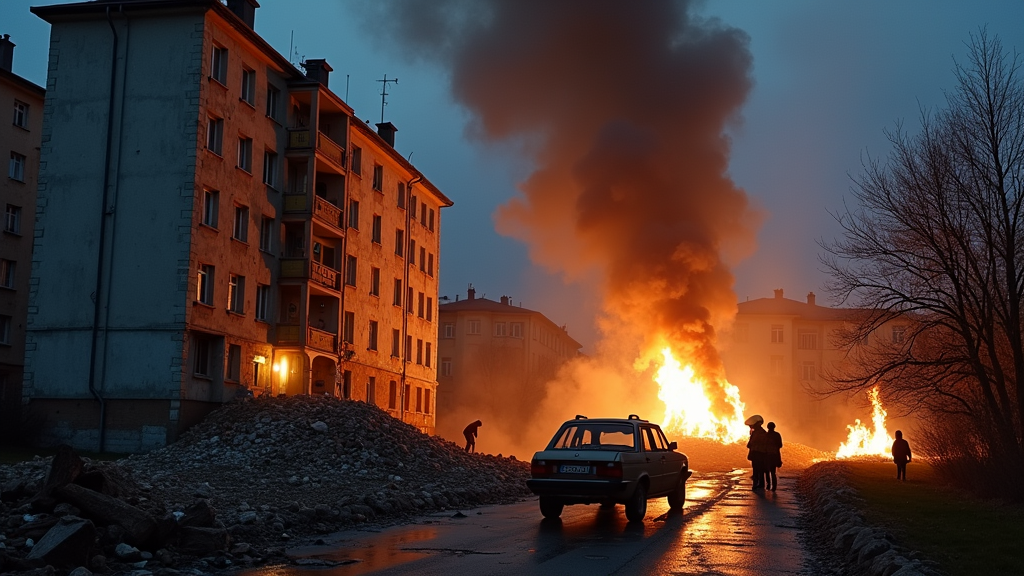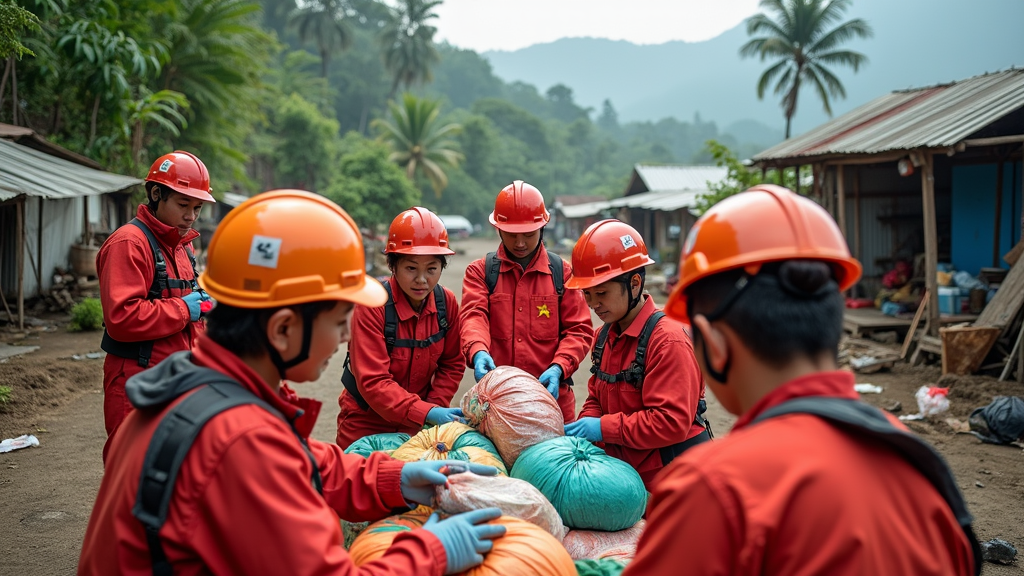Tragic Night in Kyiv: The Devastating Consequences of Russian Attacks in April 2025
Kyiv Under Attack: Devastating Consequences of Overnight Invasion
On the night of April 24, 2025, Russian forces launched a massive combined strike on Kyiv using ballistic missiles and Shahed kamikaze drones. Peaceful lives turned tragic as residents’ everyday routine transformed into scenes of horror. The most severe destruction occurred in the Sviatoshyn district, where a missile struck a residential building. These aren’t merely statistics—they represent shattered dreams, lost lives, and grieving families.
Main Consequences of the Attack
- 9 fatalities, including two children from one family. It’s heartbreaking to realize that children, who had barely started their lives, will now remain only in the memories of their loved ones.
- Over 70 injured, among them six children (the youngest being only 1.5 years old) and a pregnant woman. This stark number constantly reminds us of how fragile life is.
- Damage recorded in six locations across the Sviatoshyn district. Fires left nothing but ruins—burnt garages, administrative buildings, and cars that once symbolized daily life.
- A five-story building was damaged in the Bucha district of the Kyiv region. When walls collapse, the safe world we once knew falls apart with them.
Why does this happen? Why can entire families suddenly find themselves trapped under rubble? Did anyone wonder as the first explosions rang out at 1:10 AM? Feelings of helplessness and fear mix with hope that survivors might still be found alive.
Infrastructure Problems
Witnesses say their homes became targets, reflecting all the pain of war. Firefighting teams battled five separate fires throughout the city, ignited by missile debris. Flames relentlessly consumed everything, yet emergency services continue their tireless efforts—giving us hope that rescuers know exactly what they’re doing.
However, there’s another side—the psychologists from the State Emergency Service and police, who attempt to comfort survivors amid their own somber feelings. Can they soothe crying children and parents’ screams? Can they truly comfort those who’ve lost their homes and dreams?
Is There Anything We Can Do?
The situation remains fluid, with ongoing search and rescue operations. A critical question remains: can we, as a society, prevent similar tragedies?
These aren’t just numbers or historical crimes—these are stories of every individual who cries, suffers, and lives with trauma. Kyiv, representing Ukraine, faces another brutal strike, yet tears and grief cannot be in vain. What can we do to survive further attacks? Self-doubt poses a harsh question: is there a future if we cannot even protect our children? Only by addressing these issues openly can we find answers.
Today, explosions—not songs—fill Kyiv’s skies. We must unite again, recognizing that empathy and support are now more crucial than ever. Each day and moment is a struggle, and every one of us, whether silently or vocally, is part of this fight.
Want to learn more about waste disposal in Kyiv? Subscribe to our Telegram channel: https://t.me/World_news2035
Aftermath and Recovery
Today’s rescue efforts deserve special recognition. Those risking their lives among the debris must remember their responsibility—not just for survival, but for preserving hope. Those injured remain vulnerable physically and emotionally. Society must recognize that rebuilding infrastructure is essential, but restoring human spirits is equally critical.
Psychological Support
When a plumber fixes pipes or an electrician repairs wires, it’s important to remember there’s another crucial element—emotional well-being. Psychologists at disaster sites pick up their phones, connecting not only with colleagues but also offering support and solace to those affected. They provide more than medical aid; they offer empathy and assurance that victims aren’t alone in their despair.
Indeed, the reality is harsh: children unable to sleep peacefully, parents unable to adapt to their new reality. While city life outwardly continues, internally, trauma grips hearts tightly.
Pathways to Recovery
Kyiv’s future depends not only on state-led reconstruction efforts but also on individual contributions. How can one participate in this process? By maintaining connections among shattered lives, every story and smile contributes to the broader narrative we collectively create. In Ukraine’s most challenging times, community solidarity is our greatest strength.
Bomb shelters become makeshift classrooms, and innovative ideas transform unusable spaces into inspiring places. While new buildings rise, cities breathe gratitude toward those who stand resilient during these dark times.
Lessons and Perspectives
This attack, like previous ones, cannot be forgotten—but we can learn and move forward. It’s time for reevaluation: technologies that destroy can also aid. If drones inflict damage, why not utilize them to deliver medicines or respond to civilians’ urgent needs? Humanitarian missions still require our focus.
War, with its unpredictable consequences, also teaches that resources must be invested not only in hardware but in healing souls. As a nation, we’ll emerge stronger from these attacks if we leverage every available resource for life.
Our Responsibility
Nothing can erase the pain, but we can change circumstances. Learning to love our city even after horrors is our responsibility. Remaining united despite what has hit us affirms our resilience. By investing a piece of ourselves into community rebuilding, we transform tragedy into opportunity, fostering a new cycle of hope and rebirth.
Kyiv is more than just a city—it’s Ukraine’s heart. As we fight for our lives, it keeps beating, and this heartbeat we cannot allow to stop.
Want more on this topic? Read the news on BBC Українська and follow updates on Newsmagazine.
latest video
news via inbox
Subscribe to the latest news in the world of politics and technology







